
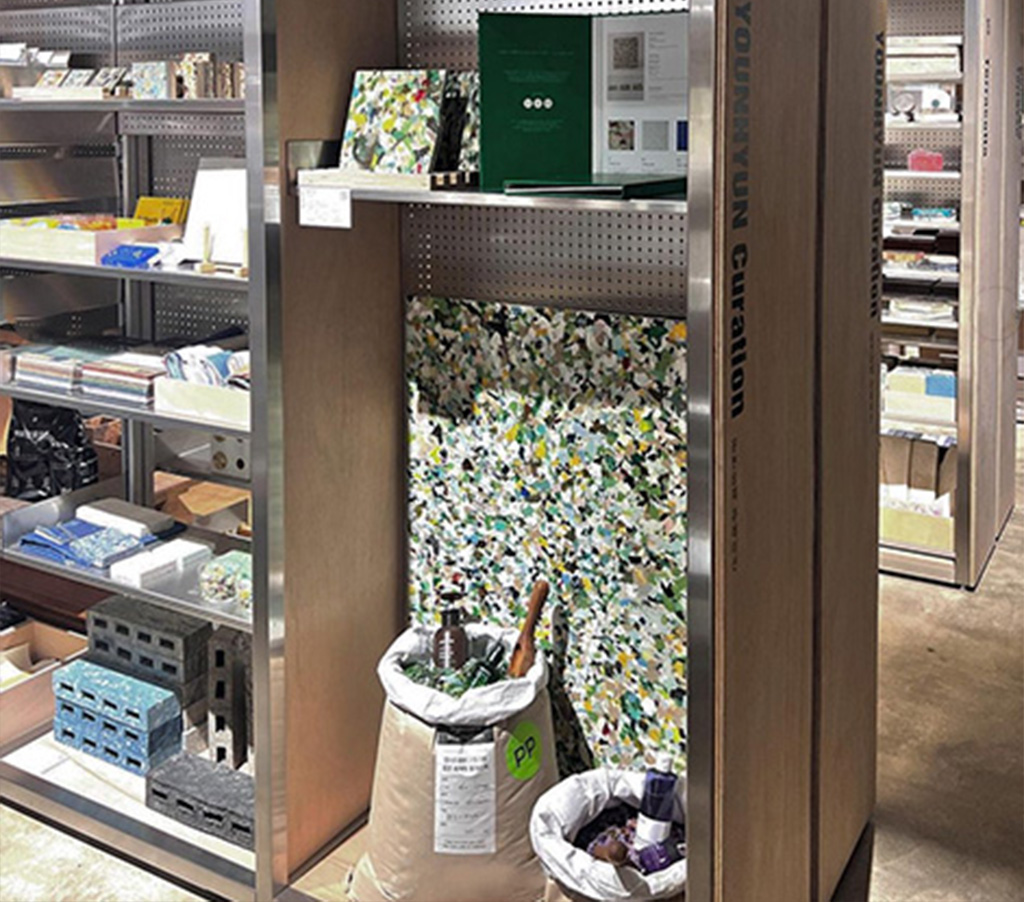
-
-
- 메일 공유
-
https://stories.amorepacific.com/en/perhaps-the-most-perfect-circle-born-from-waste-feat-resource-circulation
Perhaps the Most Perfect Circle Born from Waste (feat. Resource Circulation)

Part 2. Perhaps the Most Perfect Circle Born from Waste (feat. Resource Circulation)
Columnist
Na Woo-ri CSR Tream

In this column, I wish to discuss the companies participating in A MORE Beautiful Challenge. This social venture nurturing program, led by our company, aims to address societal and environmental issues that have captured our attention through fostering social ventures, promoting open innovation, and directing investments. This year, we are specifically zeroing in on the pressing issue of ‘plastics,’ a core ESG agenda for Amorepacific. In pursuit of this, we've linked our company’s plastic strategy with open-call sectors.i Following evaluations in May of 2023, we've selected five companies sincerely committed to achieving zero plastic. Presently, as we near the end of this nurturing program, we are on the verge of finalizing our investment decisions. Today, I would like to spotlight Oyster able and 4th Place, two participants in A MORE Beautiful Challenge, who have adopted resource circulation as their primary business model.
i. [Technology] Development of technology for plastic reduction/substitution/recycling [Experience] System and solutions related to plastic collection and recovery [Design] Design and upcycling approaches to improve the environmental friendliness of plastic packaging
Circular Economy
To tackle the plastic issue, one might argue that we should stop using plastics entirely. However, finding a substitute for plastic — which is lightweight with superior physical properties, easy to manufacture, and cost-effective — is no simple task. Moreover, the rate at which we produce plastic waste surpasses our efforts to reduce consumption. Thus, a more pragmatic solution lies in transforming this waste back into valuable resources. This underscores the need to shift from the existing linear economic plastic lifecycle, which follows a ‘produce-consume-discard’ pattern, to a circular economic cycle of ‘produce-consume-recover-recycle.’

1  Transforming Trash Data to Foster a Resource Circulating Society
Transforming Trash Data to Foster a Resource Circulating Society
In the wee hours at Gangnam Station, amidst towering mounds of garbage, the entrepreneurial idea for Oyster able was birthed by CEO Bae Tae-gwan. While the importance of cleaning up discarded waste is undeniable, he pondered: Could this trash possibly be “monetized?”
For efficient recycling and separated waste collection, civic participation is paramount. While disseminating the importance and standards of separated waste collection is essential, he believed that a proper incentive structure was necessary to motivate people. With this in mind, the IoT-based separated waste collection solution “Today's Recycling” service was developed. When recyclables are deposited into the IoT-separated waste bins called “Lalaloop,” installed in apartments, public offices, cafes, etc., points are instantly awarded via the “Today's Recycling” app. These points can be utilized like cash within the app's reward mall.

Returning a plastic bottle to Lalaloop and receiving points via the “Today's Recycling” app. *Photo by: Oyster able
Oyster able generates revenue through the rental, sale, operation, and management of these IoT recycling bins. The purchasing organizations receive ‘waste data,’ offering insights into which items are predominantly used in their respective regions, which can be leveraged for promotions and businesses. Moreover, by assigning unique codes to containers and packaging, tracing from production, usage, collection, and cleaning to resupply becomes feasible, facilitating the measurement of carbon emissions and the provision of a myriad of supplementary services. Presently, Oyster able collaborates with entities such as Maeil Dairy, OB Beer, and Nongshim, among other food and beverage enterprises.
Their recent focus has been on promoting the proliferation of reusable cups. Indeed, in a circular economy model, the step that should precede recycling is reuse. To address this, they've unveiled dedicated reusable cups so that they can track their lifecycle, reuse count, and carbon reduction via unique IDs. They have also introduced an integrated unmanned system for the rental and return of these reusable cups, covering supply, collection, cleaning, transportation, and storage of ‘reusable’ products.
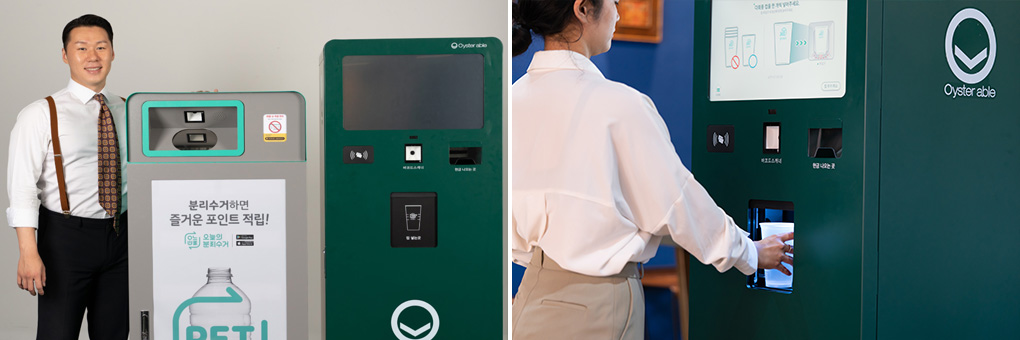
CEO of IoT waste separation container Lalaloop, Bae Tae-gwan / A glimpse of returning the Lalaloop cup. *Photo by: Oyster able
You might have often spotted Oyster able's return stations at Starbucks.ii. In Sejong and Jeju regions, they have achieved a 100% reduction in disposable cups, and in Seoul, a whopping two million disposable cups were saved across 12 stores. There's an abundance of cafes around our company, too, and we eagerly anticipate joining hands with Oyster able's multi-use cup service soon.
ii. Expansion from Jeju Airport and all Jeju Starbucks stores to those in downtown Seoul.
2  Discovering Value in the Uselessness
Discovering Value in the Uselessness
Here, I would like to delve into the tale of Lee Hye-won, the CEO of The 4th Place, who transforms discarded items into more valuable pieces of art.
The 4th Place was conceived with the objective of ‘establishing a plastic circular economy platform.’ Alongside a plastic collection solution, they aim to forge a circular economic value chain, from plastic material supply to materialization and, ultimately, product manufacturing. Concurrently, they collect and process data, providing ESG information to the market.
Through their proprietary app, a plastic collection solution named ‘Up Society,’ they source PCR plastic (recycled plastic) — which couldn't be processed in conventional recycling systems — from community members based on material types (PE/PP/PS). Subsequently, they mass-produce these into highly versatile recycled plastic sheets.
Remarkably, The 4th Place is the first in the country to boast production equipment for recycled plastic sheets of dimensions ‘1,000mm x 1,000mm x 20T.’ Using these manufactured sheets, they produce table-tops for department store furniture and exhibition booth fixtures. Recognizing the excellence of these sheets, collaborations with LUSH, Samsung Electronics, and LG Chem have ensued.

LUSH store furniture made from these sheets / LG Chem recycled ABS pellets crafted table / Samsung Electronics exhibition booth furniture (entire top sheet fabrication). *Photo by: The 4th Place
After participating in the A MORE Beautiful Challenge, The 4th Place also commenced collaborations with our company. Specifically, they embark on a project that transforms Amorepacific's cosmetic bottle plastics into upcycled sheets, and with the ideas of the Next Space team, these become artistic creations. As an inaugural initiative, some of these sheets were displayed at the Recycled Plastic Exhibition held at YOUNHYUN Material Library. In the future, they aspire to imbue the value of sustainability in art pieces by utilizing these upcycled sheets as finish materials.
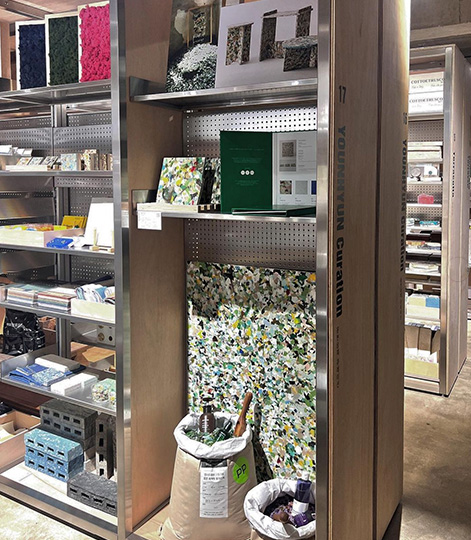
Upcycled sheets exhibited at YOUNHYUN Material Library. *Source: @teamgongzak
The plastic panels of 4th Place are brought to life through the ‘Plastic Sheet Press’ crafted by CEO Lee Hye-won herself. This machinery, which melds shredded plastic through heat and pressure, allows temperature and pressure adjustments via a smartphone application, with two iterations already showcased. The ambition ahead is the development of automated equipment, aiming for the mass production of panels with consistent properties in diverse sizes. I anticipate the birth of even more artworks and finishing materials.
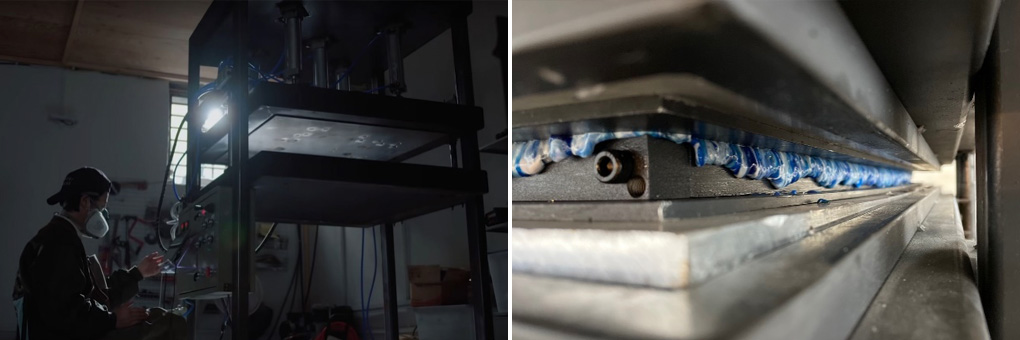
CEO Lee Hye-won is working on the Sheet Press No. 2 / The Sheet Press in action, producing plastic sheets. *Photo by: 4th Place
Here I conclude the corporate story by introducing the dazzling transformation of plastic panels showcased in 4th Place's inaugural exhibition, 4TH PLACE 1st ARCHIVE.
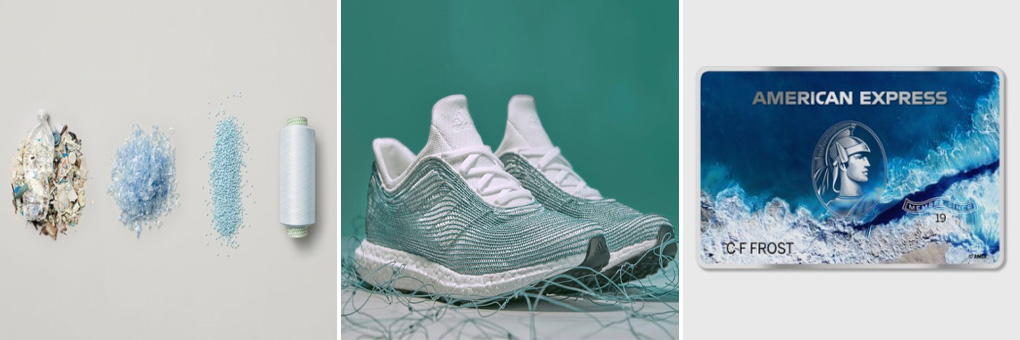
Ocean plastic / Parley X Adidas concept shoes / American Express upcycled credit card *Source: Parley For The Ocean
During our journey with Oyster able and 4th Place through the A MORE Beautiful Challenge, the case of ‘Parley For The Ocean’ came to mind. Parley for the Ocean, utilizing ‘ocean plastic’ derived from marine waste, is a marine ecosystem conservation organization, which has introduced new products in collaboration with brands such as Adidas and American Express. Through collaborations with large corporations, the reincarnation of discarded plastic not only captivates but also spurs consumer decisions, leading to purchases that wield a benevolent impact on the ecosystem. It's with the hope for the widespread adoption of this resource recycling cycle that I conclude this column.
Making a more beautiful world.
It’s the purpose behind everything we do at Amorepacific.
It’s why in 1993 we dedicated ourselves to taking full responsibility for the impact of our products.
Rather than celebrating accomplishments, we focus on what needs to be done next.
Always asking: “how can we create new beauty that benefits the world”?
We start with deep empathy for our customers, society, and the natural world all around us.
Creating the ties that bind and working together to create a more beautiful world.
In that spirt,
Amorepacific will change how plastic products are made, bought, used and discarded.
We will:
Use Less.
Recycle More.
Maximize plastic lifespans.
It’s our responsibility, and our commitment.
To you.
To ourselves.
To the planet.
Let’s think again about how we use plastics in our everyday lives.
By joining hands, the world becomes even more fantastic.
So let's reduce plastic for a more beautiful world.
Less Plastic. We are Fantastic!
-
Like
0 -
Recommend
2 -
Thumbs up
1 -
Supporting
0 -
Want follow-up article
0


